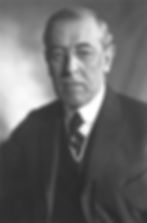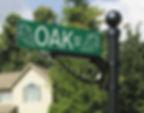What’s in an Un-Naming?
- Uriel
- Aug 17, 2020
- 8 min read
Updated: Oct 8, 2020
Should we remove names of controversial figures from public sites? Is un-naming a political exercise in volitional amnesia or a teaching moment?
By Uriel Abulof & Matthew Evangelista
I like my name. A playful Hebrew take on light and the divine, my mother chose it because I was born on Hanukah (aka the Festival of Lights) and for a poem she loves by the Hebrew poet Rachel.
Then, a couple of years ago, I learned about the unsettling Christian take on Uriel, an archangel, first in Emerson’s sad poem, then in Milton’s Paradise Lost. It starts with a nice ego boost, Uriel is “in God’s presence, neerest to his Throne / Stand ready at command, and are his Eyes,” but quickly plunges. Satan is coming for a visit, and “Uriel, though Regent of the Sun, and held / The sharpest sighted Spirit of all in Heav'n,” is utterly clueless. Milton explains, “Goodness thinks no ill / Where no ill seems: Which now for once beguil'd.” It’s enough for Satan to present himself as enthusiastically curious about the world, for Uriel to happily points out for him the way to Paradise. You know what happens next: Goodbye leisurely life, welcome original sin and the Fall! And it’s all Uriel’s fault, for he “is unable to recognize evil even when it presents itself right in front of him.” Guilty as charged.
Should I then change my name? I can’t overturn the original sin, but maybe I’ll finally stop being so dangerously naïve…

Until I do, still being my gullible self, I recently mentioned to friends my qualms about the un-naming practice that has swept over the US. The Woodrow Wilson School of Public and International Affairs, for example, where I spent nearly five years of my academic life, is now the Princeton School. Is that right?
A couple of days ago, my friend and colleague, Professor Matthew Evangelista, followed up on a patio conversation we had, and sent me a link to a piece by Tony Platt, asking the titular question, and demanding to un-name a building at Berkeley that honors Alfred L. Kroeber (1876-1960), one of the leading liberal anthropologists in the United States. A digital conversation ensued…
Uriel
I have reservations about that too. It might be true that “Kroeber’s legacy is more bitter than sweet” (I wonder what scale Platt uses to measure either, I should definitely order one), but why should we give only sweet names? If this is what we seek, perhaps the whole practice of naming after individuals is wrong. Individuals (that is, real, active, human beings) always have bitter sides, enough, in the eyes of some, to outweigh their sweetness. Every sweetheart is bittersweet.

By naming an institution, a street, a boat, what have you, after an actual person, you invite reflections on the moral complexity of the human soul. Moral reflection requires doubt; without doubt, there is no choice, no freedom.

Woodrow Wilson is one such complex person. His administration allowed for the segregation of several federal departments, following the predominant public opinion of the day. Wilson argued that separation will remove “discontent and uneasiness,” and will render black federal workers “more safe in their possession of office and less likely to be discriminated against.” Wilson, the first Southerner to be elected president since the American Civil War, also led some remarkable initiatives: domestically, he championed a most progressive New Freedom agenda; internationally, he led the US to winning WWI, and championed a global democratic agenda in its wake, including the right of self-determination, and the League of Nations. Is Wilson’s legacy too “more bitter than sweet”? Not for me, but the doubt lingers, as it should.
By deprecating doubt, demanding a pure soul, one demeans humanity as a whole, presumably the exact opposite of what un-naming seeks.

Beside meaningless, mostly numerical, names, “oak” is the most popular street name in the US. But as a famous Aesop’s fable suggests, “oak” too might be more bitter than sweet. The most popular person street-name is, expectedly, Lincoln, who, expectedly, was complicated too…
Should we then name streets after Hitler (the non-smoker vegetarian that he was…)? No, as some people are far less morally complicated than others. It is partly, and precisely, that non-complexity, the binary (non)thinking, that we ought not cultivate, as it undermines our unique capacity to reflectively choose amidst doubt.
This also raises the question of distinguishing between naming and un-naming. After all, what’s in un-naming? A political practice of a collective, chosen, amnesia. But since the choice here is to forget doubt itself (to avert our eyes from the complexities of character and moral considerations), it again undermines itself. Un-naming becomes choosing not to choose, effectively foregoing our freedom by forgetting our public past.
Public naming and un-naming are both political, seeking to set, or offset, a certain agenda. Intellectually, tracing them is tracing the twists and turns of the passing spirits of time, but we should be careful not to use (un)naming to cover up time itself.
Matt
I thought I might stimulate some fodder for a blogpost! Even though I think you might deploy it as a straw figure (excuse the political correctness) or reductio ad absurdum, I am sympathetic to your notion of not naming after people at all. I have no trouble with trees.
My main disagreement is with your claim that un-naming constitutes a “political practice of a collective, chosen, amnesia.” On the contrary, one could see it as a “teachable moment,” an opportunity to reflect on the relevant moral issues (as in the Kroeber case).
The nature of the lessons will depend on the prevailing sentiments of the time, so there is clearly something relative about our collective evaluations of people over time.
Why not organize open, respectful re-naming discussions at regular intervals, where proponents of un-naming would present their case and their alternative names, and skeptics would offer their arguments in favor of the status quo? Segregation and racism as home versus self-determination and the League of Nations abroad, as in the Wilson example. Let the debate begin! The premise would be yours, that human beings are complicated and contradictory, so let’s talk about their values and contributions.
To reiterate, this should be a process of remembering, not forgetting.

I feel uncomfortable every time I teach at the Catholic University of Milan (twice a year) in Largo Gemelli, because the square’s namesake and university’s founder, Father Agostino Gemelli, expressed disgusting antisemitic views and sought to ingratiate himself (along with the rest of the Vatican hierarchy) with Mussolini’s government for the university’s survival.

Here is Wikipedia’s on-the-one-hand-on-the-other account: “There is a long lasting discussion about Gemelli's supposed [sic] antisemitism: on the one hand, he wrote vicious antisemitic article about the intellectual Felice Momigliano in 1924 (the article was published unsigned on Vita e Pensiero and recognized later on). His alleged [sic] support of the Fascist regime's racial laws in 1938, which were aimed primarily at Jews, is controversial [sic]. On the other hand, he helped many Jews, especially several scientists (among others, Tullio Levi-Civita and Vito Volterra) )[citation needed] [sic].
None of my Italian colleagues or students seem to know this history. At a minimum, we should be considering how to replace this whitewashing amnesia with serious discussion. We could start, for example, with the four places where I inserted “sic” in the passage above.
Perhaps we could have a discussion closer to home regarding Goldwin Smith Hall, whose namesake one historian called ""the most vicious anti-Semite in the English-speaking world” during his lifetime—an exaggeration, according to Cornell historians Glenn Altschuler and Isaac Kramnick, but doesn’t the question merit more than an article in the Cornell Alumni Magazine? That seems more like amnesia than an un-naming effort.

Uriel
Yes, if we open the conversation, un-naming becomes a wonderfully edifying opportunity, engaging these questions to clarify how we, individually, and as part of society, define and refine our values, and the people we admire, and abhor. I think doing so at regular intervals could be a great initiative, almost like running public square referendums on ideas. Count me in!
I wonder though if the un-naming camp sees this so, or, perhaps, quite the opposite: un-naming as an opportunity to close the debate, to turn quandaries into “givens,” that any reasonable, enlightened, person should subscribe to, or else be damned, deemed a collaborator of the dark side. There are few things darker than unreflective conformism, and I hope contemporary liberalism will not succumb to it. There is a dangerous temptation in "egalitarian emotivism": basing morality on the emotions of disadvantaged groups, seeking, as a prime imperative, to help them feel as good as other, more privileged, groups. Interestingly, "poor Caucasians report much less hope for the future and more stress than do poor African Americans and Hispanics, who face higher objective disadvantages."
Still, those insisting on keeping these names often too partake in that occasionally deliberate, but hardly deliberative, collective amnesia. Are we all becoming “eraserheads”? (a very cool film, by the way...)

But say we somehow do manage to truly open this conversation, what is your position? Was it right to un-name the Woodrow Wilson School (especially renaming it after the Prince of Orange, who played a dominant role in expanding the trans-Atlantic slave trade)? Should we do the same with Kroeber, Gemelli and Goldwin Smith?
I think we should keep these names precisely to engage each other, and these individuals’ ideas and legacies. Un-naming lends itself more easily, I think, to dodge the debate. I didn’t know about Goldwin Smith’s antisemitism, for example, but know now that next time I’m teaching there (ah, good old days, where art thou?!), I will certainly bring the matter up, to help my students, and myself, consider acts of moral remembrance, and amnesia. Am I wrong to think that without the name still being there, such a debate will likely be less pedagogically potent?
I think your mythology would call them fallen angels. War and hate are their business, and one of their chief weapons is un-Naming - making people not know who they are. If someone knows who he is, really knows, then he doesn't need to hate. That's why we still need Namers, because there are places throughout the universe like your planet Earth. When everyone is really and truly Named, then the Echthroi will be vanquished. ― Madeleine L'Engle, A Wind in the Door
Matt
I’m sure there are some people who want to close off the debate, as you suggest. I don’t really know what the best solution is. I sometimes like the idea of keeping the name but installing an explanatory plaque. Or, with today’s technology, it could be an explanatory video screen, like the one in the lobby of Goldwin Smith, where you could display a loop of a debate on the namesake.
I’m just starting a novel by John Hersey, A Bell for Adano, set near Naples in 1943. Major Joppolo and Sergeant Borth are about to enter Adano, hoping the Germans have retreated:

Borth unfolded a map case deliberately. He put a freckled finger on the celluloid cover and said: “Here, by the Via Barrino as far as the Via of October Twenty-eight, and the Piazza is at the top of the Via of October Twenty-eight.”
“October Twenty-eight,” the Major said, “what is that, October Twenty-eight?”
“That’s the date of Mussolini’s march on Rome, in 1922,” Borth said. “It is the day when Mussolini thinks he began to be a big shot.” Borth was very good at memory.
They started walking. The Major said: “I have lost all count, so what is today?”
“July tenth.”
“We will call it the Via of July Ten.”
“So you’re renaming the streets already. Next you’ll be raising monuments, Major Joppolo, first to an unknown soldier, then to yourself. I don’t trust you men who are so sentimental and have too damn much conscience.”
Uriel
I think I’ll keep my name for now. Milton may have had it wrong, allowing Satan in could have actually been intentional, that is, if the angelic Uriel secretly shared my odd sentiment. I want the original sin, the Fall and all – let me out of paradise, and into the human realm, let me munch from the tree of the knowledge of good and evil so as to gain freedom of choice. As for my naivety, well, working on it... But of course, I might be wrong.

